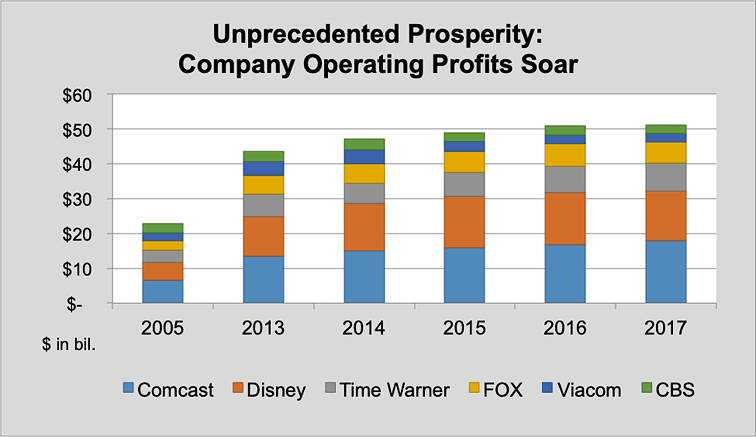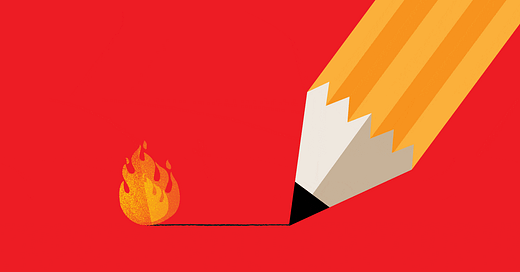The last few years have seemed like the golden age of television. There’s been more shows to watch than people to watch them and more ways of watching your favorite shows on more platforms and more devices.
The entertainment overfloweth.
But while this era known as “Peak TV” has provided tremendous opportunities for cast, crew and trade professionals in the entertainment industry … one group seems to have missed out on the bounty. Writers across Hollywood went on strike today and the reasons why have as much to do with the success of television over the last decade as they do with the story of broader income inequality in the United States.
It is much harder now for writers to earn a living wage
Streaming has changed how we watch TV. My students don’t know what the word “rerun” means anymore - they watch entire seasons of The Office over the course of one day on streaming services like Peacock and Netflix (if you are reading this, you should be studying for finals instead 🙂)
In addition to changing how we consume entertainment, streaming has also changed the way it is made. In some ways these changes have been good for entertainment professionals. In the past, a show was beholden to ratings and viewership numbers, but disrupters like Netflix were willing to take risks with shows that had low or uneven audiences. At the start of the streaming era, writers therefore found themselves with the freedom to take risks, create avant-garde shows or draft stories where expensive special effects were no barrier to their imagination (the number of fantasy and science fiction shows have blossomed over the last decade for this reason).
Streaming services treated every show like a success … even if it never became one. That time is coming to an end.
Yet over time additional changes have created an environment inhospitable to the pocketbooks of many entertainment professionals, particularly writers, in several ways:
Shorter, smaller seasons. Television is experiencing climate change. In the 80’s and 90’s most shows lasted over 20 seasons. With their larger special effects budgets shows today have shorter season-long arcs told over one season of 8-10 episodes. The cumulative season length of a show is getting shorter too. Whereas before shows would last an average of 4-5 seasons, today streaming services can make cancellations on a whim, with the average season length of a show down to 2.5. Since writers get paid over time and per show, this has meant less writers are needed per season and more writers are often out of work longer, desperately searching for their next short gig.
No competition. In the past writers made residuals when their shows, like I Love Lucy or Knight Rider, went into syndication and aired as reruns. Today, shows aren’t “sold” to other networks. Streaming services buy out most of the rights up front and then air the show only on their platform (this is why Marvel TV shows no longer air on Netflix). This means there is little upside when a writer produces a big hit with the potential for repeat broadcasts.
Income inequality. Like every other industry, per script and per episode compensation for writers has fallen (by 23%) over the last several years … even as television show budgets have blossomed into the tens of millions. This, combined with fewer opportunities to write, means that renowned award-winning television writers who have generated billions for studios over 15-20 years … still live paycheck to paycheck.
Artificial Intelligence. Conversational artificial intelligence, like Chat GPT, is becoming increasingly good at storytelling and human mimicry. Imagine a scriptwriter that remembers every call-back, plot-hole and storytelling device. A boon for nerds, but a little terrifying for scriptwriters (and probably terrible for TV fans). It’s why the Writers’ Guild of America (WGA) is demanding that future source material not be something generated by AI, e.g. a studio using AI to generate an 90% completed draft, and then hiring 1-2 screenwriters to polish the script.

These demands and legitimate grievances reflect a broader anxiety gripping workers in the United States and worldwide, one that is driven by shrinking prosperity brought about by stagnant wages, persistent inflation, ineffective government regulation and disruptive technological change.
And it is even harder for writers to win labor actions
This strike is likely to last a long time, likely because streaming services like Netflix and Hulu argue that things haven’t been great for them either. Every streaming company has cut costs and fired staff, and shareholders are unlikely to be sympathetic to raising the wages of writers.
But more importantly, increasing consolidation and horizontal integration mean that tech companies like Apple and Amazon are also now some of the largest movie and television studios in the world. Tech culture’s obsession with results and progress are likely to clash with the traditional culture of mutual support in the entertainment industry (98% of WGA members, for instance, authorized the strike - a startlingly high number).
Oligopolies and monopolies also reduce the incentive to bargain. The consolidation of the entertainment industry means that companies like Comcast aren’t just streaming companies - they own theme parks, physical cable networks, hotels and news networks. With hundreds of reliable revenue sources, a writers strike is likely to be about as annoying as a flea bite. Instead of an existential threat to a lone studio, a walk-out may be just bump in the road for companies like Apple and Comcast, something they can leverage their immense wealth and technical expertise to work around.
So what can you do?
As a consumer of the products produced by writers, the easiest step is to increase your consciousness about the issue. This edition of the newsletter is a start, but there’s a lot more to be learned.
While writers go on strike, they don’t earn an income. Support writers with food and snacks for as little as $5.
If you’re in LA or New York, you can join the picket line (if permitted) to physically show your support.
🎧 Now Playing On The UnfairNation Podcast
✈️ Catch Me If You Can
Phoenix | May 15
🕺🏽 Opportunities
Coming Soon: 📡 Signal Boost! I’ll be expanding this opportunities section into something more comprehensive and hopefully more valuable to all of you.
📅 Reading & Watching
Losing the Signal, by Jacquie McNish and Sean Silcoff.
🙌🏽 FairNation
How a wayward duck changed a Kansas City homeless man's life:
Why should I care about posterity? What’s posterity ever done for me?







I'm scheduled to fly to NYC this weekend specifically to attend a taping of The Daily Show. The taping will most likely be canceled, which is a bummer. But this strike is so much more important than my entertainment. (It's NYC - there are a million other fun things to do.) I hope the WGA gets what it's striking for!